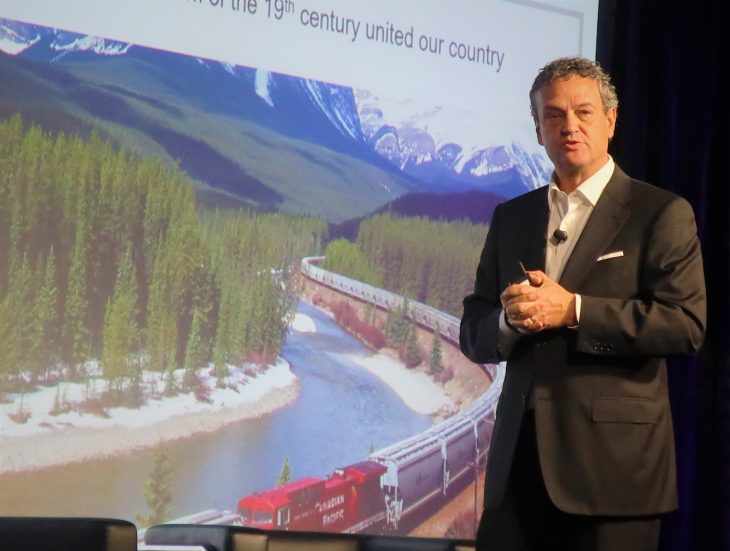
TORONTO – In front of a backdrop of a Canadian Pacific train winding its way through the Rockies, Telus technology strategy EVP Eros Spadotto (right) offered a more creative take on the message Canadian wireless carriers are delivering at the 2019 Canadian Telecom Summit.
During his Wednesday morning keynote (just hours ahead of ISED Minister Navdeep Bains’ speech), Spadotto drew parallels between what our cross-country rail system delivered more than 100 years ago and what 5G wireless will be able to deliver very soon – saying it’s not, and never was, about the technology itself.
The developments brough on by sea-to-sea rail links were not truly about the rail gauge or track cross-sections or locomotive advancements, all of which were impressive and needed at the time. As well, today’s telecom engineers and coders love to talk about the speed and latency improvements 5G will bring, or about IoT or data throughput.
“But… so what,” Spadotto said to all of the impressive, required tech and cool use cases.
“What really matters,” he said, “for any of these things we’re building is delievering societal change. Social good.”
“Look at the rail system where we had all those use cases… but what did we do? We united a country… we allowed the free movement of cultures… we had a lot of really incredible social outcomes that help define Canada as it is today.”
Now, on the telecom side, one such example of social good is being able to deliver finally on long hoped advancements like remote medicine, which is possible with fibre and 5G’s ultra-low latency. The social good there is detecting illness and healing Canadians without having to fly hours to a major centre. Another already mostly delivered social good is the “death of distance” where pricey long distance calls are a thing of the past and how knowledge workers don’t have to abandon their home towns for the big cities thanks to the ability to call on advanced networks to work remotely.
Of course, underlying Spadotto’s presentation is the message being delivered at CTS by all carrier executives: Delivering those societal goods to the nation requires well-structured policies which don’t undermine the investments needed to get 5G connectivity to as many Canadians as possible and mandating MVNOs would do just that.
“We know we’re building the next-generation railroad… delivering the next generation social goods.” – Eros Spadotto, Telus
“Sometimes our policies are a little short-sighted,” he said. “We know we’re building the next-generation railroad… delivering the next generation social goods.”
Delivering that in Canada does cost more than doing it in other countries, Spadotto said. “Canadian operators do business in Canada,” he pointed out. This means Canadian carriers have to buy technology in U.S. dollars, that our population density is very low, making it challenging and expensive to build out networks as far as needed, and “we participate in a healthy middle class, and with a healthy middle class cost structure – and I am thankful for it,” he added, saying he gladly pays taxes and loves our national health care system.
(Ed note: hmmm… Strong middle class.That messaging sounds familiar…)
Spadotto also told delegates an anecdote about a fibre build he came across while in Florida, where the cable first doesn’t have to be buried very deeply (no chance of frost) and that migrant labourers were doing the job for about $12/hour. He compared that to Canada where Telus technicians in Toronto make more than $30/hour generally.
However, despite all of this, he added, Canada is ranked second globally on its national wireless networks when it comes to speed and latency (so says OpenSignal). The carriers have spend billions (too many billions on spectrum in auctions  featuring set-asides, he noted) of dollars on network technology and spectrum pushing state of the art connectivity as far and wide as possible.
featuring set-asides, he noted) of dollars on network technology and spectrum pushing state of the art connectivity as far and wide as possible.
“Our spectrum policy has been such that we create many bands of spectrum. In fact, if you look today, our busiest cell sites literally have 72 power amplifiers on top of a roof (or tower). That’s incredible because you look at other jurisdictions in the world and they will have far wider spectrum bands and far fewer of them so it’s much easier in other places in the world to create speed.”
Canadian carriers have worked hard and invested heavily because of the competitiveness of the industry, all of which has boosted Canada to its number two position, backed by policies which make sense – and mandated MVNOs do not, he said later in his speech.
Looking at countries and regions which did mandate MVNOs, they are largely undoing those choices because there “has been a downturn on investment from folks who actually build networks.”
We’ll hear more on this – and from the ISED Minister Navdeep Bains – later today.


